- Home
- Natalia Ginzburg
A Place to Live Page 13
A Place to Live Read online
Page 13
We cannot reproach him for having become a rich, shrewd old man. A person can be quite rich and quite shrewd, yet manage somehow to remain a free spirit. It is difficult, I imagine, but not impossible. More likely what is so depressing about him today is actually his optimism. The things he thinks and writes. The pathetic, hollow optimism of an octogenarian for whom everything turned out just fine.
Buster Keaton, as far as I know, left no memoirs. The silence within him and the silence surrounding him must have been immense. Old age vented its fury on him, laying waste his body and his parched, bare, defenseless face. And yet he remained himself, sealed in his silence, loyal to the infinite despair that could only be speechless, human speech being so pathetically inadequate, forever loyal to the infinite freedom of never uttering a single word.
May, 1970
universal compassion
I believe the worst of our present misfortunes is our great difficulty, in the face of whatever event, in distinguishing the victims from the oppressors. No matter what transpires, whether public or private, our intellectual response is to avidly pursue the root causes and seek out the probable guilty parties. But before long we stop short in bewilderment: the causes appear numberless, the reality too tortuous and complex for human judgment. We have come to recognize that no event, public or private, can be considered or judged in isolation, for the more deeply we probe, the more we find infinitely ramifying events that preceded it, all the way back to its source. In such a subterranean labyrinth, tracking down the guilty and the innocent seems a hopeless quest. The truth darts from place to place, slipping and sliding in the dark like a fish or a mouse.
We have seen firsthand, in matters both private and public, how those whom we loved and sympathized with as victims can change overnight, taking on the odious guises of cruelty and persecution. And yet we can’t help regarding them as the victims they once were. We don’t know whether to understand and pity them as victims, as before, or to judge them solely in this new guise. Moreover, it seems dreadful, incomprehensible, that those who have been victimized can use violence on their fellow men and fail to see in them their own likeness, as of only yesterday.
If we probe still more deeply, we come to realize there is no human being who has not suffered injustice, no human circumstances that do not merit understanding. But with such universal understanding, no one remains to be judged or condemned. Individual responsibility and moral judgment are apparently doomed to vanish from the face of the earth.
The fact remains that those of us who are older can vividly recall a not-too-distant past when taking one side or the other and distinguishing justice from injustice was a matter of the utmost simplicity. Truth’s likeness, back then, was clear, unmistakable, and unshakeable; it was close at hand—we always knew where to find it. We could never have imagined that one day it might seem hidden and elusive. Not only were events simple to judge, presenting themselves in primary colors, with truth’s limpid, radiant image shining above them; not only was our conception of reality far less vast and cluttered, so that we could act in good faith on our indignation or our approval. We also had no inkling that innocence and guilt are so often mingled, tangled in such tight knots that human beings, with their crude and inadequate yard-sticks and their faulty senses, are quite unable to unravel them. We had no inkling yet that human beings are weak and without the resources to grasp the complexity of world events. This awareness of our inability to distinguish the truth and pursue it through its endless implications, explanations, and ramifications is a source of profound misery.
When confronted with some specific act that would inevitably be labeled cruel or unjust, we tell ourselves, or we are told, that even more unjust, more cruel, and more bloody acts are taking place in other parts of the world. Thus the sense of outrage is always deferred or projected elsewhere. When we think we can pin the evil and guilt on a specific person, on whom we long to vent our legitimate loathing, we tell ourselves, or we are told, that behind that person stand institutions, a maze of powerful vested interests, and that if we consider his position carefully, he too is ultimately no more than a defenseless and guiltless victim. We’ve also learned, or have been told, that our outrage at or endorsement of individuals is of no importance; the important thing is not to be outraged or supportive but rather to examine the causes and origins of every event. We think, or we are told, that it is foolish to use our customary yardstick of good and evil. We ourselves find it crude, inadequate, and obsolete. Using it feels like using a spade, while our hands and minds have grown used to compasses and calculators. We’re ashamed to use such a crude domestic tool. And yet, however much we deride its crudeness, we still believe this kind of tool to be indispensable. Without it, the world becomes utterly indecipherable. True, it may be an inadequate yardstick for the huge and cluttered range of events we face at present; and true, we no longer know how to use it, with our hands grown so weak and unreliable. Perhaps there is some secret way to make such an instrument more subtle, more articulated, more sensitive, to transform it so it might keep pace with our understanding. But we don’t know this secret way; we are nowhere near knowing it. And so the tool for judging good and evil drops from our hands like a spade, and all we can do is lament its crudeness and deficiencies.
Whether we are witnesses or protagonists, our instinctive reaction to whatever happens, private or public, is anger or approval. Weighed down by love and hate, we are forever seeking a place to unload them. But we cannot find the right place or the right person, since we tell ourselves, or we are told, that individual responsibilities in such complex matters are of minimal importance; and so we carry around this terribly heavy burden of love and hate, not knowing what to do with it, until it rots and withers in our arms, then drops to our feet. And all the while we gaze fixedly at reality, our eyes glazed with weariness and universal commiseration.
To grant any value to our moral judgment is too daunting; to use it feels too shameful; all we have at our disposal today is a vast compassion for ourselves and the world at large. With universal compassion, surely we can’t go wrong. It is the one feeling we can give ourselves up to without fear of error. Such a flood of pity, in ourselves and others, may seem bizarre, given that our world and its vicissitudes are consummately cruel and pitiless, offering not the faintest glimpse of the profound pity that imbues us. Then again, our compassion is informed neither by intelligence nor by any real will to improve the world or ourselves. It is merely the result of fatigue and confusion, like a nervous outburst of tears that leaves us prostrate but unchanged. In any case, tears cannot lead us astray, for without a doubt, the world we find ourselves in has earned them.
In this kind of world, the winners’ faces can very readily turn loathsome. Victory swiftly takes on gigantic proportions—monstrous, unreal, cut loose from the human community. A world made up of the weak and the wretched hates the advent of winners, knowing that all too soon they will take on inhuman ways and unreal, dismal, lugubrious garb. Therefore even if we don’t know which side to support, we feel somehow drawn to the side of the losers. That is all we can do, in our desperate, confused quest for someone we can love without fear of error. Ours is not so much a moral choice but rather a yielding to an instinct of affinity. We cannot even imagine a happy world where the winners would not be hateful. Only in the losers can we recognize any kindred spirits—for if we call them ill-fated, battered victims, for the time being, at least, we feel sure we cannot go wrong.
October, 1970
III
vitai immaginaria (Fantasy Life) was published by Mondadori in 1974, when the author was 58. The essays show the accumulated wisdom of maturity, but even more, they show its impatience and defiant freedom. Ginzburg never hesitated to criticize, but here, as in “No Fairies, No Wizards,” or the pieces about the discordant chaos of contemporary Rome, she does so with positive relish. And in “Fantasy Life” she probes her intimate life—the life of the imagination—more deeply than ever before. The r
esults are startlingly frank and unsettling. Yet her acceptance of her own bitter experience and decline is so unstintingly felt and rendered that it amounts to an affirmation of the darkest kind: that is the note Ginzburg strikes perpetually, and nowhere more purely than here.
such is rome
Though it seems to do its utmost to be as ugly as possible, I still find Rome, the city I live in, very beautiful. Besides finding it so beautiful, I love it dearly and wouldn’t leave it for anything in the world. Nevertheless, it has become quite difficult both to love it and to live in it, since these days it is a jungle of automobiles. If ever there was a city made for walking, it’s this one; the cars seem to have invaded it by stealth, like an attack of blight. I cannot understand who wanted them, since everyone curses them. They overrun the city like a river at flood tide, they appear to have erupted from the bowels of the earth, and every so often they fill the city with a long, exasperated, mocking shriek that sounds at once like a jeer and a cry for help.
The cities we choose to make our own, as adults, are a composite of the image we had of them in childhood, before we ever saw them; the image they presented when we saw them for the first time; the yearning we’ve felt when far away; and finally, our indifference or anger as we walk through them after long years of residence. The feelings they inspire in us after so many years are no different from the feelings inspired by people, when a prolonged and daily habit of living together has streaked our love with intolerance and anger. At some point we become aware that the intolerance and anger, grown over the love like lichen, have not worn it down but rather made it stronger, deeper, and inextinguishable. Then we try to call up distant images of these people or these places at our first encounter, when we didn’t yet know whether it was to be a minor, fleeting encounter or something essential and enduring.
We often tend to compare the cities we chose as adults with those where we spent our childhood. Often we congratulate ourselves for having pulled up our early roots and set down new roots and habits elsewhere. And, strange to say, having grown old now, we maintain this peculiar pride in having sunk roots and habits far from our childhood landscapes. Why we should feel such pride is a mystery, since one doesn’t deserve any special credit, in the scheme of things, for having left one’s city of origin. And yet, till our dying day, the inexplicable banner of our pride flutters over the cities we chose as adults.
In the past, when I had spent brief periods in Rome or when I recalled it longingly from far away, I used to enumerate the reasons why I loved it. I thought that I loved its strange air of seeming small while it was enormous. At night in Rome, one had the feeling of ambling down village lanes. What made it resemble a village might have been the cats or the silence or the rich peace of certain vast, deserted piazzas, or the uncanny, pervasive sense of an invisible countryside, wooded and boundless, quite close by. How on earth the country could seem so close by, in those stony surroundings, that we could feel, amid the darkness, the rustling expanse of fields and trees, I cannot say. We could sit down on a staircase, gaze at the cats, the grass, the moon, the fountains and the ruins, and enjoy a strange and solemn pastoral silence. We could think it was summer when in fact it was winter. I found the seasons in this city often jumbled, which felt extraordinary to one who grew up in Turin. I was used to Turin’s interminable freezing winters, when fog and darkness would hold the city clamped and stiff in a stern, impenetrable slumber. It seemed Rome could never sink so totally into winter, for beyond the cold one could always be surprised by an unlikely whiff of indolence, of summer vacations. It seemed a place where something unpredictable was always happening. When it rained and the entire city was like one enormous puddle, there might appear in the midst of the rain, from I don’t know where, a sudden warmth and glimmer of spring. A sky heavy with swollen yellow clouds might suddenly be lit by a fiery twilight color. All these reasons were why I thought I loved it. Still, it is true that during my first few years in Rome I pined with homesickness for Turin and its endless winters. Even as I walked through Rome or leaned against its balustrades thinking how warm and mild the stone here always felt, I had a wrenching nostalgia for Turin and specifically for one street in Turin, and that was Via Nizza. Why I yearned for Via Nizza I don’t know. It was a street in my old neighborhood, but not the street where I grew up. And yet I would have given anything at all to be on Via Nizza, walking among its very tall buildings sealed with ice, breathing in its fog, its winter and melancholy.
Indeed I think my early love for Rome was mingled with that nostalgia for Turin, my native city, from which, at that time, the war kept me. Our feelings for cities, like our feelings for people, are always rather confused, with all sorts of things mixed in. What is clear is that we don’t love cities, or love people, for any reasons that can be enumerated. In the Rome of today I don’t see the slightest trace of the reasons for which I once claimed to love it. It’s no longer possible to look at the sky here, or to be aware of the seasons. It’s not even possible to exchange an affectionate word or glance with the city anymore. Cars overrun its sidewalks. It is stricken by cars as by some malignant disease. Nothing, nowadays, feels as distant and remote as the countryside. The cats and the ruins remain, but it never occurs to anyone to look at them—you’d have to seek them out behind the cars. And at night Rome definitely doesn’t feel like a village. But it doesn’t feel like a great, restless city either, not by night or by day; the fact is that it doesn’t feel like anything. It’s as if it no longer knows what to be. The cars do thin out at night, but the silence in the streets now is never tranquil and profound. It is a silence without peace, an expectant silence, prostrate with exhaustion. It is a silence still vibrating with the echo of that lacerating, querulous shriek, the shriek of cars tied up in traffic, and the whole city waits for that shriek to start all over again very soon, with its harrowing, mocking appeal for help. Around the edges of the city, houses keep springing up that bear no resemblance to it nor to each other, all of them dreadful but each one dreadful in its own individual way, houses that appear leprous and decrepit from the moment they are built. They don’t know what to be either—city houses or country houses—yet they seem to seek a connection with the city’s center. The only connection they manage to achieve, though, is that they too writhe in the stranglehold of the cars. Years ago, an outcropping of new houses had already sprouted up on the edges, a tangled, deformed, fragile vegetation, but the city, in its supreme and oblivious indifference, seemed able to shelter and sustain every species of deformity. Now its indifference, apparently doomed to last forever, has given rise to a vague weariness, a hidden bafflement and sadness, in a city which was never weary or baffled or sad. It is the sadness of having lost its essential nature and being unable to assume another.
This is the Rome of today, which I no longer like, which no one seems to like, and yet we all love it, for the truth is that cities, like people, are loved for no reason at all or for a tangle of reasons, different for everyone. In Rome during the war, I lived in hiding in a convent on Via Nomentana, sharing a room with an old Jewish woman from Vienna whom I made friends with. She was very kind, and when I went out she would mind my infant daughter. I had a small electric stove, and now and then this little old lady would ask if she could use it. Although I had told her many times that she could use it whenever she liked, still she would announce every time she was about to use it. On cold afternoons, she would get up from the bed and say, “My dear Signora, I make myself the tea.” One might well ask how in the world this little old woman in exile, whom I haven’t seen since and who must be long dead, enters into my feelings for the city. But for me, Via Nomentana and the dark corridor of the convent and its high windows grazed by trees are inseparable from the memory of that very tiny old woman sitting on the bed in a brown shawl, and I think I began to love Rome while seeking some kind of maternal protection in that little old woman, who in turn wanted my protection along with my stove. So that now, when I go down Via Nomentana, buried in
cars and unrecognizable, I remember how beloved that street is to me; I recover the keys to my affection by murmuring those long-lost words, “My dear Signora, I make myself the tea.”
December, 1970
no fairies, no wizards
The publisher Giulio Einaudi is bringing out a new series of children’s books called “Tantibambini,” edited by Bruno Munari. Four books are already available. I received them. They were very nice, I thought. Inexpensive. Pleasing to the eye. Easy to handle. I thought the best illustrations were those accompanying a selection of Edward Lear’s Nonsense Verses. There’s also a book by Gianni Rodari, a story called Mr. Cat’s Business. I read it quickly and found it quite charming. Gianni Rodari is one of Italy’s very few writers of children’s books. Children adore his books. I myself prefer his poetry to his prose, but children love his stories as well (at least the children I know). So far so good. And yet there was something bothering me and I wasn’t sure what it was. Another book is called Birdie Tic Tic, by an author called Poi. I don’t know who this Poi is. I read that one quickly too—it only takes a couple of minutes. It’s about a little boy who’s afraid of a wolf, but Birdie Tic Tic feeds the wolf, he gives him lots of onions, sardine heads and old shoes, the wolf isn’t hungry anymore and becomes good, the boy isn’t afraid anymore. A sweet story. At some point I realized that what was irritating me were the words that appeared on the back of every volume: “Simple stories and fairy tales—no witches and no fairies, no splendid castles or handsome princes or mysterious wizards—written for a new generation of free spirits, uninhibited, assertive, and fully aware of their own strength.” Little by little I realized that I found these words not merely irritating but detestable. They struck me as hugely presumptuous. Had Birdie Tic Tic been presented casually, without any such pretensions, and had this series legitimately embraced children’s books of every kind and genre, well then, fine, but if Birdie Tic Tic was being offered as heralding a pedagogical program and as the bible of the coming generations, in that case, I decided, Birdie Tic Tic was revolting.

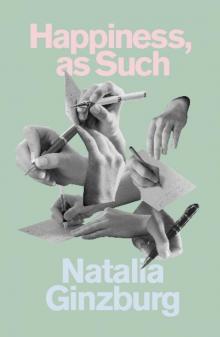 Happiness, as Such
Happiness, as Such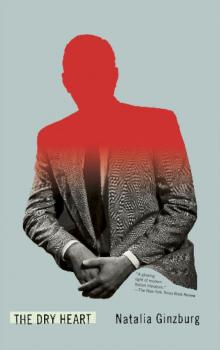 The Dry Heart
The Dry Heart The Manzoni Family
The Manzoni Family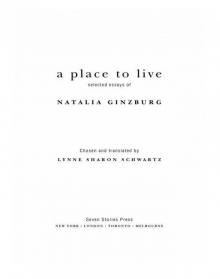 A Place to Live
A Place to Live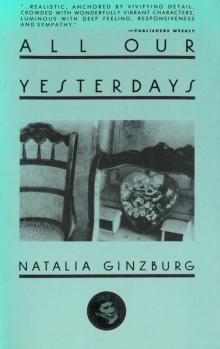 All Our Yesterdays
All Our Yesterdays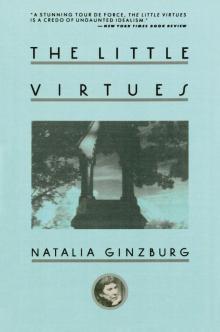 The Little Virtues
The Little Virtues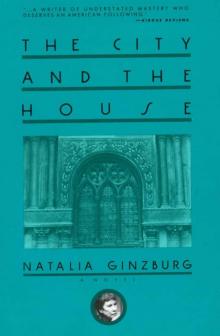 The City and the House
The City and the House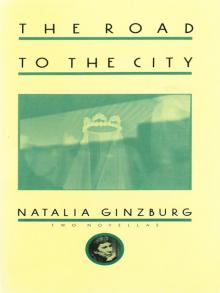 The Road To The City
The Road To The City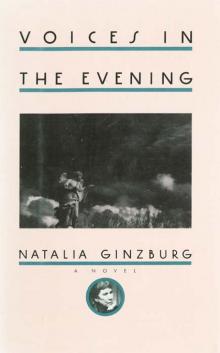 Voices In The Evening
Voices In The Evening